Food Tour of Iowa: La Quercia
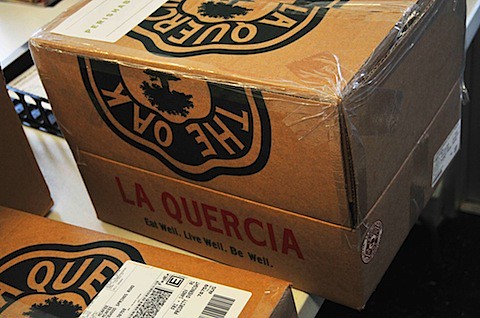
This was a notable visit for me. You see, La Quercia was the place that inspired me to travel around Iowa and look for local foods and local producers. To me, it is an exemplar of how I think food should be produced: Herb Eckhouse, the owner and lead prosciutto maker at La Quercia, describes what he does as making food, not making a product. I could not agree more fully. Both he and his wife, Kathy, are prime examples of people who live and preach the idea of “real” foods.
Herb’s commitment to quality is evident in every part of the prosciutto production process at La Quercia. From the rigorous standards with which he selects his pork, to the scientific precision with which he controls the curing process, everything in La Quercia speaks volumes about Herb’s unstinting commitment to creating the best prosciutto he can.
It all starts with local, organically raised ham, which he gets from a handful of local purveyors, depending on what the final product will be. All the pork is from local, sustainably raised animals. The reason for this is obvious: only three ingredients are ever in his products: pork, sea salt and spices. The essence of great prosciutto, he told me, is the rich concentrated flavor of the pork after it has been cured. This is only possible when you start with best pork.
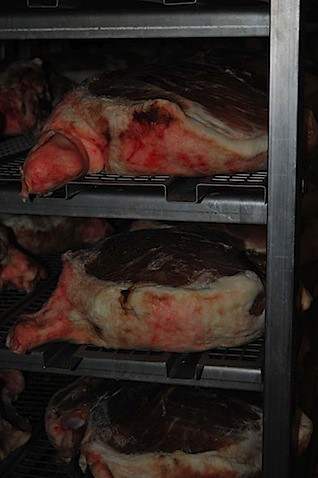
Above: The fresh hams start with a chilling period, which emulates the fall and winter.
After the pork has been sourced, it is brought by truck to the state-of-the-art prosciuterria at La Quercia. There, a variety of climate and humidity controlled room’s mimic the four seasons, in order to produce prosciutto that is not too dry or salty. At the most basic level, prosciutto is very easy to make. Italian peasants originally made it, in order to preserve the meat so that it could be eaten in the winter. However, there is nothing simple in the process Herb employs today, although the product speaks volumes to its correctness. Essentially, the entire process simply involves rubbing the ham with sea salt, and perhaps spices, and then curing it over a long time. However, Herb has perfected his technique with a state of the art curing process. His involves a set of rooms that cool and warm the prosciutto slowly, so that the salt has the optimal conditions to extract the water from the ham and concentrate the innate flavor of the organic Iowa pork. All of Herb’s equipment is imported from Italy, and a computer controls the humidity and temperate of each room individually.
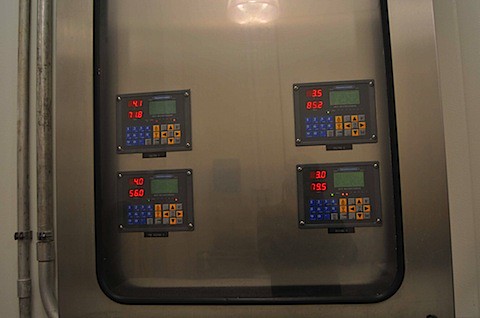
Above: The central computer the ensures that La Quercia is cured in the optimal conditions
As we walked through the rooms, I saw the results of the process at each step. The hams were slowly condensing and becoming smaller, as the salt leached the water out. Herb is currently expanding his operation, so as to be able to approximately double his weekly output in response to strong consumer demand.
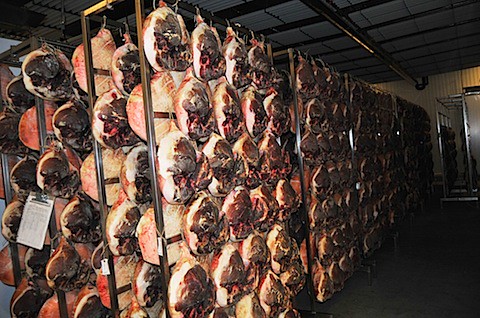
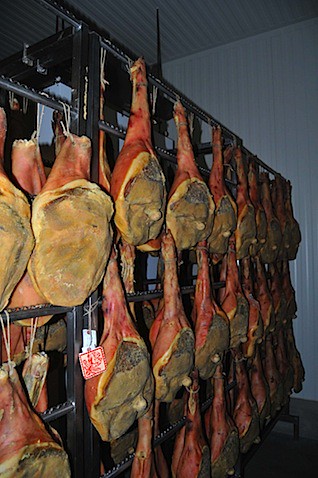
Above: As you can see, the hams become more and more condensed and finished. The second photo is of an experimental batch, where Herb cured the entire leg. Usually, the ham is separated. Note the yellowing of the salt cure.
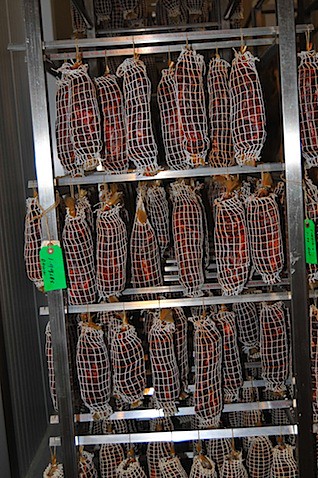
Above: The coppa; a lightly smoked and delicious product.
But the real question is, what are the results like? I am happy to report that Herb’s perfectionism yields some of the best pork I have ever tasted. Considering the complexity of the process, the result, when seen on a plate, is deceptively simple: a gorgeous ruby-red slice of prosciutto, with some snow-white fat on the bottom. To taste it is to know the essence of pork and ham. It had a pronounced flavor, which is very simple and very strong. Even minutes later, I could still distinctly taste the prosciutto’s unctuous flavor. It was incredible. You don’t have to take my word for it; no less prestigious foodies than Robert Parker and Mark Bittman have given the prosciutto of La Quercia their highest regards. The list of chefs who use La Querica Prosciutto is no less impressive; Mario Batali and Wolfgang Puck both are users.
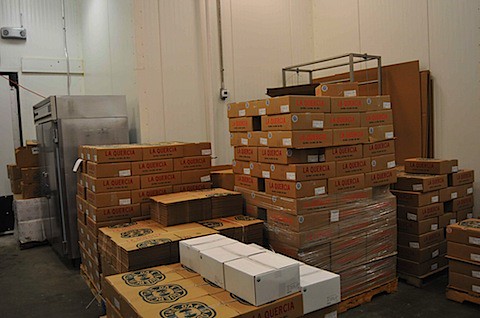
Above: Boxes ready to be shipped out to eager gourmands and restaranteurs
Afterwards, we chatted about matters of importance to the slow foods movement. Herb, like myself, is a fervent believer in the necessity of creating food, not a product, and doing so in the best way one can. I can honestly say that if every food producer approached their work with the honesty, integrity and pride with which Herb approaches his, the world would be a good deal closer to perfection.
1 comment:
Nice! Now I want to meet him.
Post a Comment